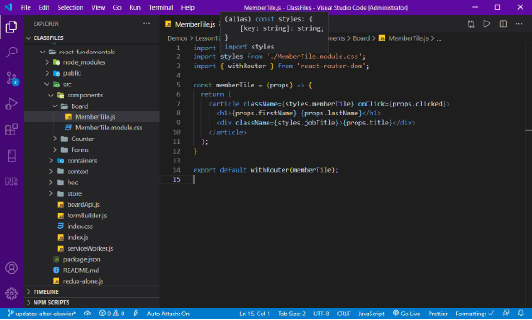

React Fundamentals Training
5 days (10:00 AM - 5:00 PM Eastern)
$2,495.00
Register for a live online class.
Details
Subjects Covered
Prerequisites
Setup Requirements
Details
Course Details
React is a JavaScript library for building interactive user interfaces. It can be incrementally adopted, scaling easily from being used as a library to add small functionality to web pages to being used as a framework for a complete single-page-application. React also provides hooks that allow easy interaction with other JavaScript libraries and frameworks.
This course will give the student a solid and in-depth foundation for building applications that use the powerful features provided by React.
Subjects Covered
- Introduction
- What is React
- Why use React?
- SPAs and React Web Apps
- NextGen JavaScript Features
- React Syntax and Basics
- Using Create React App
- Component Basics
- JSX
- Props and Dynamic Content
- State and Event Handling
- Two-Way Binding
- Dynamic Content
- Conditionally Rendering Content
- Collection Content
- Updating State Immutably
- Collections and Keys
- More Flexible Collections
- Styling Content
- Inline Styles
- Dynamically Setting Styles
- Dynamically Setting Class Names
- Using Radium
- Using CSS Modules
- Debugging
- Understanding Error Messages
- DevTools and Sourcemaps
- React Developer Tools
- Error Boundaries
- Components
- Creating Components
- Stateless vs. Stateful
- Component Lifecycle
- Pure Components
- Higher-Order Components
- Validating Props
- Context API
- Web Server Interactions
- AJAX Calls
- Using Axios
- Rendering Fetched Data
- Avoiding Infinite Loops
- POSTing Data
- Handling Errors Locally
- Interceptors
- Routing
- Setting Up the Router Package
- Rendering Components for Routes
- Using Routing-Related Props
- Absolute vs. Relative Paths
- Nested Routes
- Route Guards
- Routing and Deployment
- Forms
- Custom Dynamic Input Components
- Configuring a Form
- Handling Form Submission
- Custom Validation
- Showing Error Messages
- Managing State with Redux
- Complexity of State Management
- How Redux Works
- Reducer Functions and State Store
- Dispatching Actions
- Creating Subscriptions
- Connecting React to Redux
- Dispatching Actions from Components
- Async Redux
- Adding Middleware
- Redux Devtools
- Action Creators
- Handling Async Actions
- Action Creators and Get State
- Testing
- Required Testing Tools
- What to Test?
- Testing Components
- Jest and Enzyme
- Testing Containers
- Testing Redux
- Transitions and Animations
- Using CSS Transitions
- Using CSS Animations
- ReactTransitionGroup
- Using the Transition Component
- Wrapping the Transition Component
- Animation Timing
- Transition Events
- Introduction to Hooks
- What are React Hooks?
- Getting Started with useState()
- Updating State
- Multiple States
- Rules of Hooks
- Passing State Across Components
- Side Effects
- Sending HTTP Requests
- useEffect() and Loading Data
- Understanding useEffect() Dependencies
- What is useCallback()?
- Refs and useRef()
- Cleaning up with useEffect()
- State Batching
- Understanding useReducer()
- useReducer() and HTTP State
- Working with useContext()
- Performance Optimization with useMemo()
- Custom Hooks
- Getting Started
- Sharing Data with Components
- Using a Custom Hook
Prerequisites
Before Taking this Class
Students should have a good understanding of HTML and CSS and be experienced JavaScript developers, with an advanced understanding of JavaScript objects and functions as first class citizens.Setup Requirements
Software/Setup For this Class
- Node.js installed
- Any text editor (we recommend Visual Studio Code: https://code.visualstudio.com/)
- At least one web browser (Google Chrome is recommended)
- Internet connection
Onsite Training
Do you have five (5) or more people needing this class and want us to deliver it at your location?

